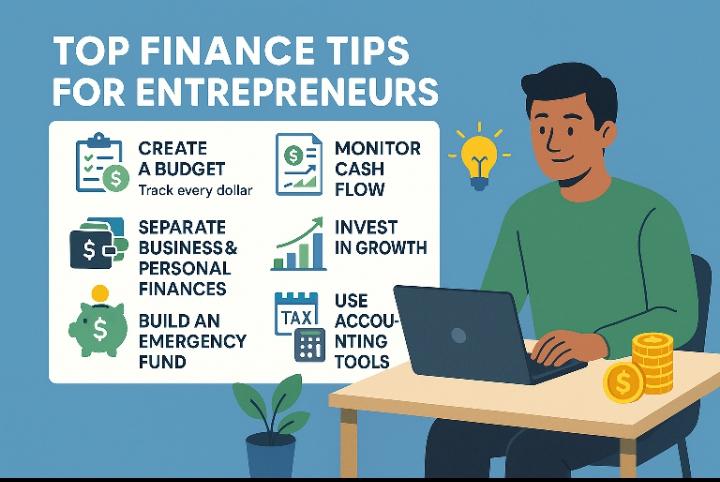TOP FINANCIAL TIPS FOR ENTREPRENEURS.

- Create a budget : Track every money put in the project or business. Sure! To help you create a budget, I’ll need to know a few things:
a. Purpose of the Budget:
Personal budget? Business? Event? Project?
b. Timeframe:
Monthly, quarterly, yearly, or for a specific project duration?
c. Income/Revenue Sources:
What are the sources of funds or income?
d. Expense Categories:
Fixed expenses (e.g. rent, salaries)
Variable expenses (e.g. utilities, travel, supplies)
2. Separate business finance and personal finance: Here's a concise summary of business finance and personal finance.
--Business Finance:
Business finance refers to the management of money and other financial resources in a company. It includes:
Raising capital (through loans, investors, or issuing shares)
Managing assets and liabilities
Budgeting and forecasting
Making investment decisions
Analyzing financial statements
Ensuring profitability and sustainability.
The goal is to maximize value for stakeholders while maintaining financial health.
--Personal Finance:
Personal finance involves managing an individual’s or household’s money. It includes:
Budgeting income and expenses, Saving and investing,
Managing debt,
Planning for retirement,
Insuring against risks,
Setting financial goals.
The goal is to achieve financial stability and meet personal life goals.
--Key Difference:
Scope: Business finance focuses on organizations, while personal finance is about individuals or families.
Objectives: Business finance aims for profit and growth; personal finance aims for security and wealth accumulation.
3. Build an emergency fund.
An emergency fund is a financial safety net designed to cover unexpected expenses or financial emergencies, such as:
Job loss
Medical emergencies
Major car or home repairs
Unplanned travel
--Key Features:
Purpose: To provide financial stability and avoid debt in emergencies.
Accessibility: Should be kept in a liquid, easy-to-access account (e.g., savings account)
Separation: Should be separate from regular savings or investment accounts.
---Benefits:
Reduces stress during financial crises.
Helps avoid high-interest debt (like credit cards or payday loans).
Provides peace of mind and financial independence.
In short, an emergency fund is a crucial part of personal financial planning, offering security and flexibility when life throws unexpected challenges.
4. Monitor cash flows.
Monitoring cash flow means tracking the money that comes in (income or revenue) and goes out (expenses) over a period of time. It’s essential for both personal and business finance.
--Why It’s Important:
Prevents shortages: Ensures there’s enough money to cover bills and expenses
Supports budgeting: Helps you make informed financial decisions.
Identifies patterns: Reveals spending habits or areas of concern.
Improves planning: Aids in setting realistic financial goals and forecasting future needs
--How to Monitor Cash Flow:
For Personal Finance:
Track income, bills, and everyday expenses (apps like Mint or spreadsheets can help)
Review bank statements regularly
Compare monthly income vs. expenses.
For Business Finance:
Use accounting software (e.g., QuickBooks, Xero)
Create and review cash flow statements
Monitor accounts receivable and payable
--Key Tip:
Always aim for positive cash flow—when income is greater than expenses—to build
financial health and stability.
5. Invest in growth.
Investing in growth means allocating money or resources toward opportunities that can increase wealth, income, or business value over time.
--In Personal Finance:
Growth investing involves putting money into assets expected to increase in value, such as:
Stocks
Mutual funds or ETFs
Real estate
Education and skills development.
Goal: Build long-term wealth and achieve financial goals like retirement, home ownership, or financial independence.
--In Business Finance:
Businesses invest in growth by funding initiatives such as:
Research and development (R&D)
Marketing and sales expansion
Hiring and training staff
New product lines or markets
Upgrading technology or infrastructure
Goal: Increase revenue, market share, and company value.
--Why It Matters:
Drives long-term success
Helps stay competitive
Increases income and asset value over time
Builds resilience and adaptability.
Smart growth investments are strategic, well-researched, and aligned with long-term goals.
6. Understand taxes
7. Use accounting tools.
https://amarscity.com/cp/my/blogs #amarcity #finance #business #entrepreneurs #start-up #fyp #nigeria #blog

- Business
- Art
- Causes
- Crafts
- Dance
- Drinks
- Film
- Fitness
- Food
- Παιχνίδια
- Gardening
- Health
- Κεντρική Σελίδα
- Literature
- Music
- Networking
- άλλο
- Party
- Religion
- Shopping
- Sports
- Theater
- Wellness
- Technology
- Cryptocurrency
- Psychology
- Internet
- Ecommerce
- Family
- Others
- Science


